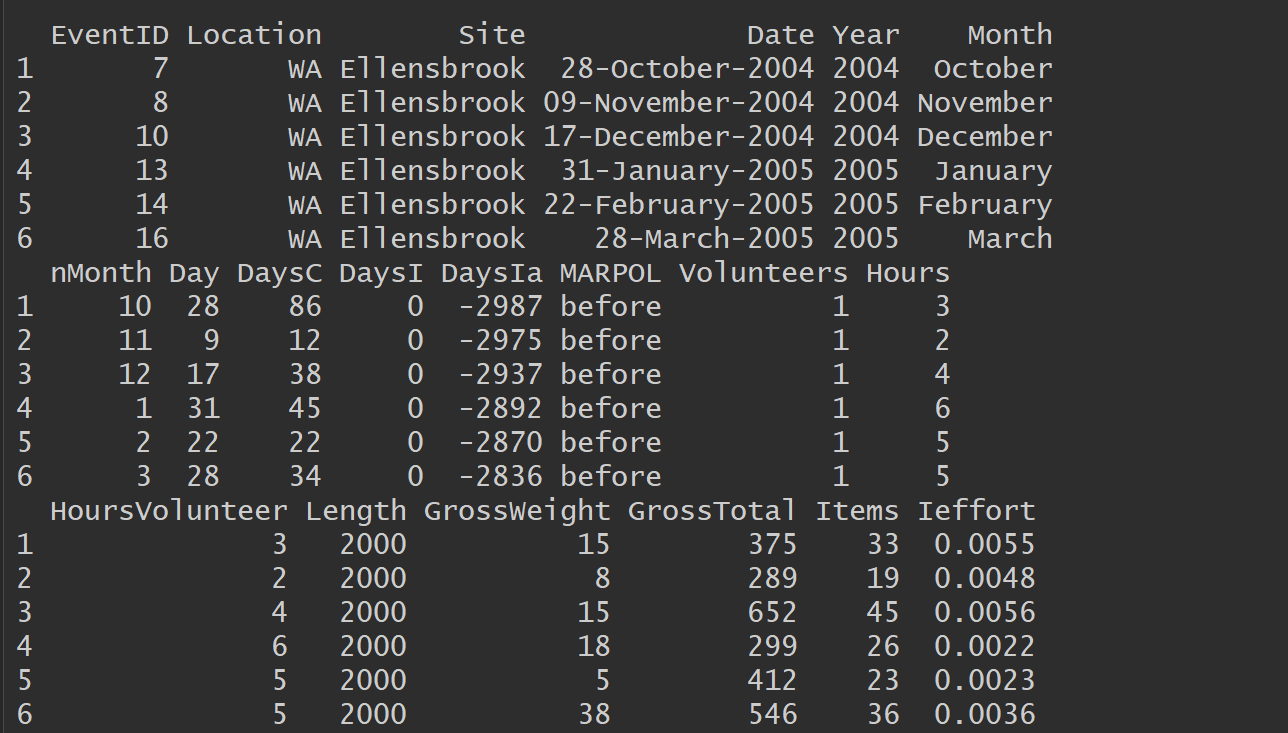I have a dataset of marine debris items (number of items standardized per effort: Items/(number of volunteersHoursLenght)) taken from 2 main locations (WA and Queensland) in Australia (8 Sub Sites in total: 4 in WA and 4 in Queensland) at irregular sampling intervals over a period 15 years.
I want to test if there is a change over the years on the amount of debris in these locations and more specifically a change after the implementation of a mitigation strategy (in 2013).
Here’s the head of the data:

Description of each one of the varables in the dataframe:
eventid = each sampling (clean-up) event
Location = Queensland and New South Wales
Sites = all the 9 sampling beaches
Date = specific dates for the clean-up events (day-month-year)
Date1 = specific dates for the clean-up events (day-month-year) on the POSICXT format
Year= Year of sampling event (2004 to 2018)
Month= Month of the sampling event (jan to dec)
nMonth= a number was determined to the respective month of the sampling event (1 to 12)
Day= Day of sampling (1 to 31)
Days = Days since the first date of clean up = just another way of using the dates
MARPOL = before and after implementation (factor with 2 levels)
DaysC = days between sampling events for the same sites = number of days since the previous clean-up event
DaysI = Days since intervention, all the dates before implementation are zero, and after we count the number of days since the implementation date (1 jan 2013)
DaysIa= same as DayI but instead of zero for before the intervention we have negative values (days)
Items = number of fishing and shipping items counted in each clean-up event
Hours = hours spent by all volunteers together at each clean up event
Lenght = Lenght of beach sampled by all volunteers together at each clean up event
volunteers = all volunteers at each clean up event
HoursVolunteer = hours spent bt each volunteer at each clean up event (Hours/volunteers)
Ieffort = the items standarized by the effort (hours, volunteers and lenght)
GrossWeight = total weight of the all the items found (not just fishing and shipping debris)
GrossTotal = total amount of the all the items found (not just fishing and shipping debris)
Problems:
My data has a few problems:
- I think I will need to fix the effects of seasonal variation (Monthly) and .
- of possible spatial correlation (probability of finding an item is higher after finding one since they can come from the same ship).
- How do I handle the fact that the measurements were not taken at a regular interval?
I was trying to use GAMs to analyse the data and see the trends over time. The model I came across is the following:
m4<- gamm(Ieffort ~ s(DaysIa)+MARPOL+ s(nMonth, bs = "ps", k = 12), random=list(Site=~1,Location=~1),data = d)
How can I handle the fact that the measurements were not taken at a regular interval, the seasonality and the possible spatial correlation? Am I on the right track?

